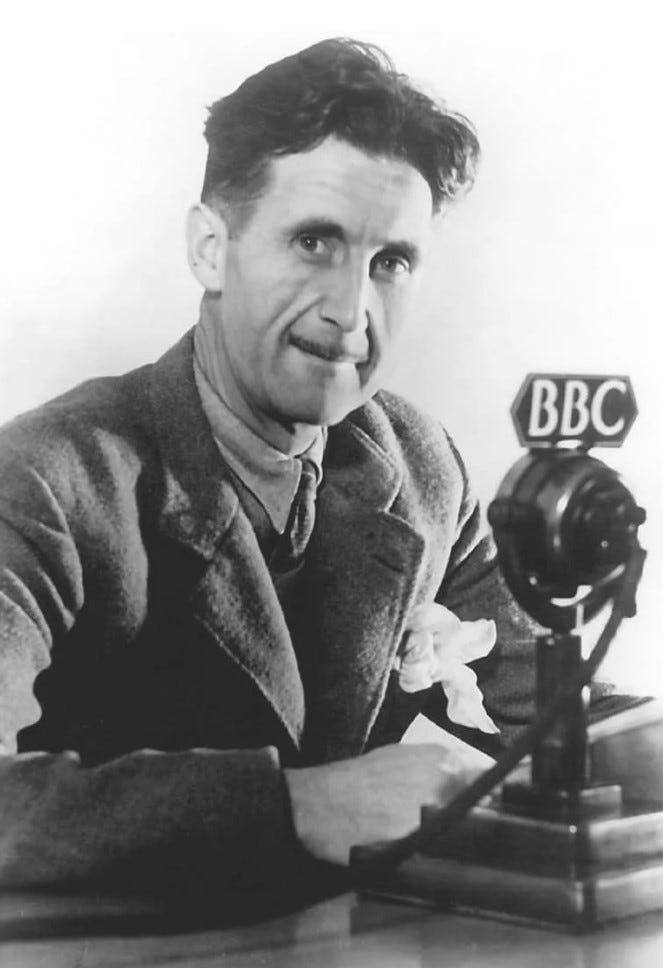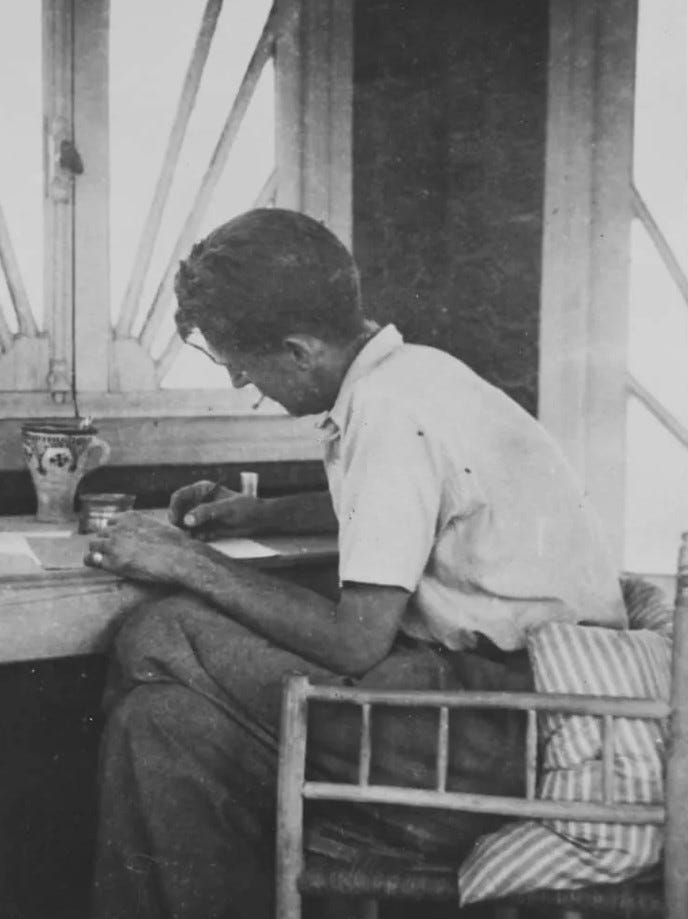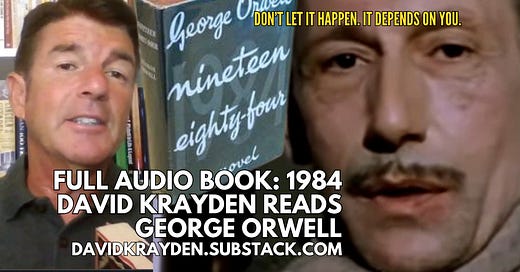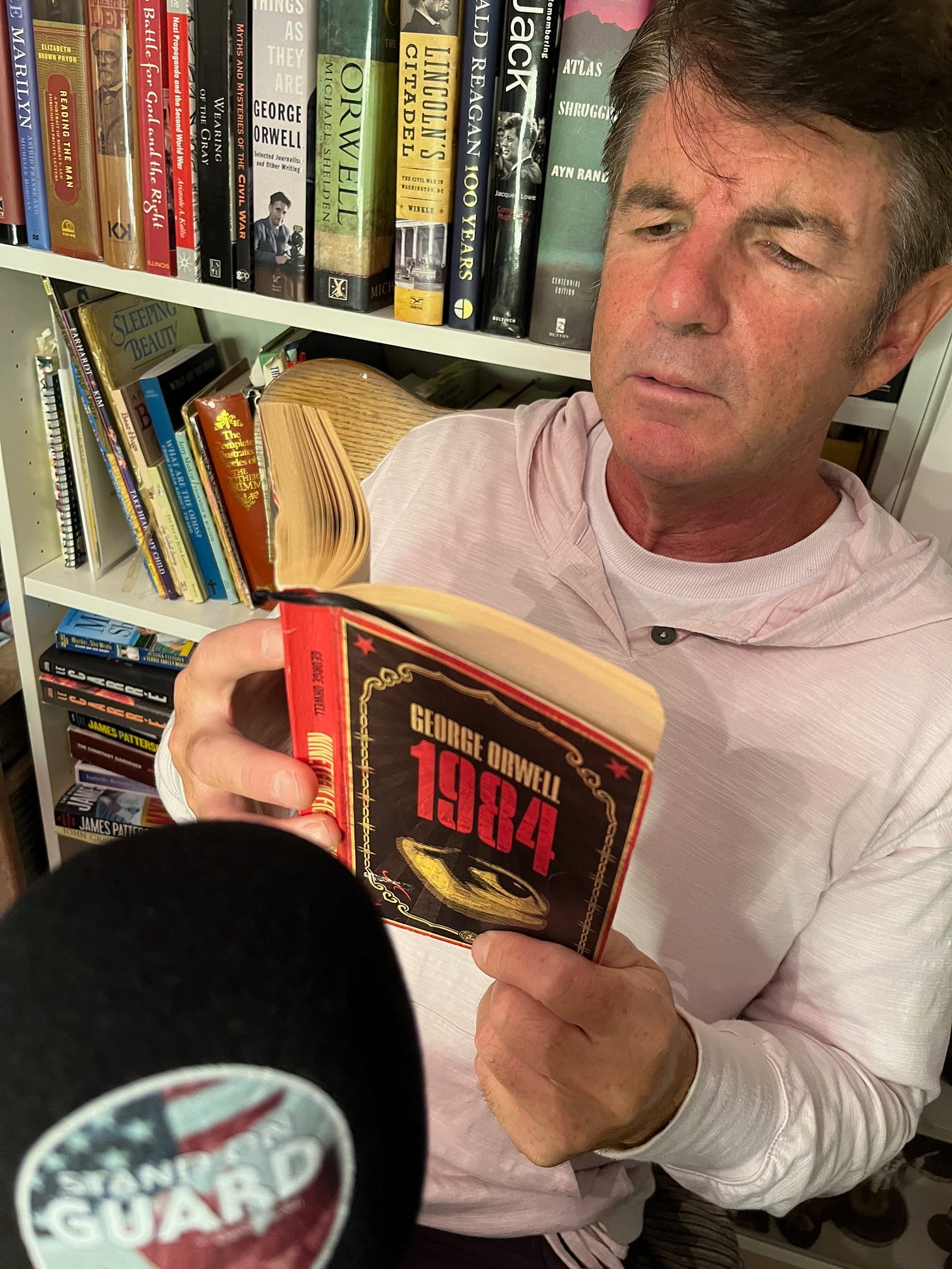AUDIO BOOK: 1984: Complete Chapters with Commentary: David Krayden Reads George Orwell's 1984 Podcast
EXCLUSIVE to Substack: George Orwell's 1984
Welcome to the 1984 Audiobook complete chapters with my commentary. I hope you enjoy George Orwell’s final novel, 1984 or Nineteen-Eighty-Four, as much as I have enjoyed reading it out loud. This Audiobook has evolved from my David Krayden Reads George Orwell Podcast, exclusive to Substack which I have read with commentary over the last couple of months.
I have always loved George Orwell, since my university days, but his literary works really deserve to be revisited today as his vision and insights are increasingly becoming our reality today.
I have included an essay I have written about George Orwell in this public portion of this Substack.
For paid subscribers, you will have access to the complete 1984 Audiobook links along with commentary.
If you want to get right into it, then immediately after the paywall, I have included the chapters in chronological order.
Also included after the paywall are my original personal insights on the book regarding how it relates to today’s current events and politics both within the written commentary, that includes a chapter synopsis, which can serve as a reading guide.
Thank you for joining me here on my Substack to celebrate George Orwell. My hope is in reading this audiobook compilation, you will consider sharing it widely and use it to help wake our family and friends up, before it is too late.
Let me know what you think about George Orwell’s novel 1984, about my essay, and about this Audiobook compilation. And what you would like to hear me read next.
-David Krayden (@davidkrayden)
Become a PAID Subscriber to davidkrayden.substack.com & you will receive COMPLETE "1984" David Krayden Reads George Orwell Audio Book Package with Commentary.
ESSAY: Why George Orwell Really Matters Today
George Orwell is one of the few people whose last names have come to describe an odious political condition, a particular dystopia and state of mind — “Orwellian” is how we describe the kind of censorship and cancel culture that thrives in what used to be traditional democratic states.
Yet, Orwell was his pen name. Eric Arthur Blair, aka George Orwell, was a socialist who voted for the British Labour Party, but he was never comfortable with socialism or the inevitable excesses of the state that would be used to enforce socialist dogma.
He mocked the tendency of socialists to mandate what one ate, who one supported and ultimately how one thought.
Why 1984?
Well, I think that's pretty obvious.
Aren't we living in an age that could be characterized as something akin to the novel 1984, with its increasing state authoritarianism? 1984 is Orwell’s timeless classic that just continues to become more frighteningly real in the age of the World Economic Forum, COVID-19 mandates and the authoritarian efforts to censor speech and eradicate “disinformation” with legislation entitled the “Online Safety Act.”
When you listen to the words of this book, you are listening to Orwell’s thoughts as he denounces collectivism and, conceivably, realizes that socialism is inextricably tied to the state coercion that he despised so much.
You are also listening to an eerily prophetic description of the age in which we now live.
We have constant wars — war without end — where we are in constant conflict with somebody. This has been the case for decades now. And we also have these emergencies — chronic, excessive catastrophic emergencies. COVID-19 is one example of this state of constant emergency, that allows the state to usurp our rights, to take away our freedoms, to force us to do things.
And, of course, the surveillance state is very real today. Big Brother and all big tech, is indeed watching all of us.
With censorship laws on the horizon, and actively happening now in most western democracies, including Canada, that's precisely why this book fascinates. Why this book is compelling.
And why this book is so damn frightening.
-David Krayden on George Orwell’s 1984
And in the process, we are weaker. And this is what 1984 is all about.
But it's also about how language has been destroyed, how it has been degraded, how it becomes deteriorated, because the state insists that black is white that night is day.
We have governments today that are literally telling all of us that black is white.
And 2 + 2 = 5.
That truth is lies.
Become a PAID Subscriber to davidkrayden.substack.com & you will receive COMPLETE "1984" David Krayden Reads George Orwell Audio Book Package with Commentary.
Who is George Orwell?
George Orwell, of course, as many of you know, was his pen name. And although everybody knew him is George Orwell, his real name was Eric Arthur Blair.
He was in the foreign service in his first career and served in Burma, which was the basis of his novel Burmese Days (1934), his first novel, written just after the modst success of the non-fictional Down and Out in Paris in London (1933).
He certainly did a lot in his short life. And he did not live very long. He was a very prolific writer, not only of novels and non-fiction accounts of poverty and civil war but journalism as well. But he wrote hundreds of columns. Column after column, after column, and his collected works make up three vast volumes.
I’ve read them all.
I have always really enjoyed George Orwell as an author because as somebody once said, he writes like somebody thinking out loud. It is as somebody would talk to you, as if they're telling you a story. And that, of course, is supposed to be the basis, the foundation of journalism, it's supposed to be like telling you a story where the reporter tells the most important things first, using the inverted pyramid. Anyone who has been to journalism school knows that.
When I was in journalism school, at Carleton University, my first year, we were told to read 1984. And, you know, I don't know if I had actually ever read 1984 until that assignment was given to me. I certainly knew about the book; virtually everybody knows about the book. People know “1984” means something sinister. It represents dystopic, dystopian state of the future, which I think we're fast becoming.
But journalism schools in those days at least still believed that journalists should tell the truth and that there was such a thing as objective truth. And that George Orwell had something important to say.


I doubt very much it is on as many reading lists today, because most journalists today are largely partisan to the point that they don't believe in objective truth anymore. They believe in pushing and promoting a certain policy or certain political idea, at the expense sometimes of their own credibility and of their own integrity. And this is what impresses me about George Orwell.
Well, I get comments all the time from people who watch my broadcasts or read my columns and they say, don't you know George Orwell was a socialist. Well, of course, I know George Orwell was a socialist. He voted for the Independent Labour Party in Great Britain. Probably the last vote he ever cast was for the Labour Party, but that's what makes him interesting is because he was a socialist who actually knew and understood the working class and who was not afraid to criticize the socialist political elites, whom he called “parlour Bolsheviks.”
He lived and worked with the working class, Down and Out in Paris and London is a literary documentary of his experiencing doing menial labour in some of the dirtiest kitchens within some of the best hotels in Europe. And describing how he lived in these circumstances and the environment he lived and worked in while receiving starvation wages. Sometimes he's between jobs, earning nothing. And this is at the height of the Great Depression in Europe, which was as bad and probably worse than what we experienced in North America — in Canada and the United States.
So, he understood the working class and poverty.
And his book, The Road to Wigan Pier (1936), is a classic about poverty. He visits Welsh miners, spending time with these families. And he understands their needs. But yet he doesn't emerge from these experiences as some rabid Bolshevik.
His socialism is the kind of socialism that says, wouldn't it be nice if people just looked after each other and treated each other kinder. And that the state needs to look after the neediest.
He's not into the authoritarianism. He's not attracted to pigeonholing people. He's not enthused about classifying everybody into a widget. He's not obsessed by control. And somehow, and in his early days, he thinks you can achieve socialism without the state being that involved.
The more you get into this book [1984], the more you realize there's so many truths here.
-David Krayden on George Orwell’s 1984
I'm not saying he's a social anarchist. But he really does believe the state should be kept at arm's length. And somehow, socialism would just arrive in a timely fashion. And people should just treat each other in a more equitable manner.
He’s a bit naive about this. But at the same time, he's a socialist who is uncomfortable with socialism. He's uncomfortable with socialists, who are haranguing people, who are telling people how to live, what to drink, how to drink, what to eat, and how to dress. He already sees that this is what the Left is about. It's about controlling everything you think, say or do or wear, or eat or drink, or, how you think. He’s understanding this very early in his career — what socialism is really all about. For most people anyway, but not for him, socialism is actually about controlling the way people think. And this, inevitably and ultimately, evolves into 1984.
He fights as a volunteer in Spain, not for the for the Stalinist-backed Loyalists, and certainly not for the Fascists, but for the anarchists. This is because he understands that Stalin is behind much of the leftist movement in Europe, Stalin is controlling it. That the Soviet Union is behind it. Whether they're shoving people into gulags, as opposed to concentration camps, it’s the same thing. The Stalinist regime was controlling everybody and killing people by the millions. And it's all about state control. And Orwell is not comfortable with this.
And of course, when he writes the novel in 1948, Hitler may be gone, but Stalin is at the peak of his power and is dominating all of Eastern Europe and is threatening the world and is one year away from possession of the atomic bomb.
So ultimately, just before he dies, he wrote 1984. And it's a classic and remains a classic. He decides the future is bleak if the state is going to be worshipped by the masses.
Why did he call it 1984?
Well, I alluded to the fact that he wrote the book in 1948. So, what he did was he inverted the last two numerals of the year he was living in 1948, became 1984. And that's how the book got the title.
And he wrote the book and unfortunately, never really saw the huge success it became. He knew it was successful, but he didn't know it was going to become a multi-million best seller. Or, that it would become something that was on the curriculum of universities the world over. That it would be hailed as a modern-day masterpiece of political theory. He never saw that, because he died in 1950 at 47 years of age. He didn't even make 50 years old, which is very, very sad.
But his book lives on. And in many ways, 1984 the novel, is where we're at today. And as I read this book, I think it's going to become apparent why 1984 is where we're at today, because we are living in an in an age of Newspeak, which Orwell talks about along with doublethink.
What are you willing to do to fight for your freedom? “Don’t Let it Happen. It Depends on You.” These were some of George Orwell’s final words to a BBC reporter, following his writing of the 1984 novel, before his early death at 47 years of age. It was essentially his message to the future — his message to all of us.
Conclusion
I must admit that when I watch the news lately, I sometimes think I am watching a film or something that is unreal. We are edging towards a nuclear catastrophe and democratic governments along with the mainstream media are cheering on the conflict. Has the world gone mad?
We have been talking about the world becoming more Orwellian for so long, but it has now become a reality, no longer a warning.
If we are to fight back, we will need to sustain our freedom of speech and that means to stop allowing people like Justin Trudeau and leaders in the developed countries to undermine our freedom of speech. As 1984 teaches us, we who know what freedom is must ensure that the next generation understands how fragile that freedom can be in the hands of governments and global agents who are anxious to take our liberty away and replace it with serfdom.
So that’s the George Orwell we know.
We know him from his most famous book 1984. Within it you have seen how we must unify to stop the authoritarian impulse.
I think, as much as Orwell appealed to people of all classes, we must today appeal to people of all political ideologies and say, very strongly, that we need free speech.
It is time to fight back.
As George Orwell said, “It is up to us.”






